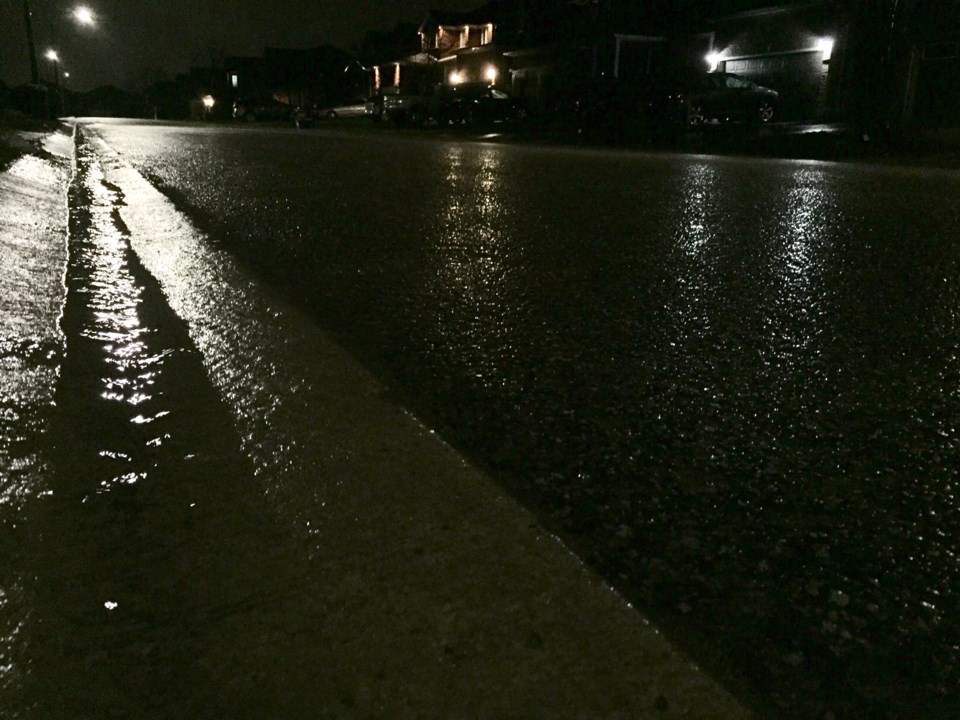It's not part of current city budget deliberations, but property owners with lots of hard surfaces like rooftops and impervious driveways can count on being targeted later this year to help pay for $40 million in local stormwater management improvements.
Catherine Taddo, who's spearheading a city stormwater financing study, won't say when the issue will land on the desks of city councillors, other than to indicate it will be sometime this year.
But Al Horsman, the City of Sault Ste. Marie's chief administrative officer, told a budget input meeting last month that it should happen "fairly shortly."
Horsman was responding to remarks from Kara Flannigan, local Green Party candidate in both federal and provincial elections.
Flannigan clearly favoured charging ratepayers for melting snow and rainwater flowing off hard-surfaced patios and parking lots, carrying pollution into waterways and posing flood risks.
"I come from a camp that likes to tax things that we don't want," Flannigan said. "We don't want stormwater runoff. We need permeable driveways."
"I know that our city is going to be wrestling with stormwater runoff on properties, and that's part of climate change," she added.
"If people had bigger driveways and they paid higher taxes for those types of things, or if they replaced their impenetrable driveways with penetrable driveway surfaces, it saves the rest of the city, because there's less runoff that we have to worry about rebuilding infrastructure under Wellington Street to get it to run away faster so our homes don't flood. Planting more trees is good for climate change. It's good for reducing stormwater runoff," Flannigan said.
Horsman responded, confirming something like that was indeed being considered for the Sault.
"There's a stormwater management process and policy that's being brought forward for council's consideration fairly shortly. Other municipalities have done it. Newmarket has done it. Guelph has done it, where they look at those types of things and incentivize reducing your stormwater runoff. You put it onto the actual individuals," Horsman said.
Guelph introduced a stormwater fee in 2017, but last year it added one-time rebates to recognize efforts made by owners of industrial, commercial, institutional and multi-residential properties of six units or more, who reduce the amount of stormwater runoff.
In Newmarket, a special stormwater charge was introduced in 2017, penalizing properties that produce more runoff, especially commercial and industrial lands.
Then, Newmarket added a credit program for businesses that introduced stormwater and/or pollution prevention measures, and subsidies for residential plantings of backyard trees.
Until now, Sault Ste. Marie has paid for stormwater infrastructure through property taxes (general and urban‐only tax levy) based on assessed property value, with contributions from the Ontario and federal governments.
City Council will be asked to change that.
"It's now off the tax bill," Horsman told Flannigan.
"It's still a surcharge that's going to be to constituents. A constituent is still going to be looking at that as a cost to them. It comes down to what is it you're trying to achieve and how are you trying to achieve it, and what's the positive rationale for what you're trying to do," Horsman said.
"We're going to be bringing forth for council's consideration, stormwater management. We're going to to be saying: 'This is the right thing to do because this this what we're going to be able to accomplish with it.' There is still going to be a cost associated with that to individual homeowners, but it takes it off the tax bill in that at least in that component, there's some control by the homeowner over that cost, because they're the ones that control what it is they have have in terms of surface area."
In natural areas, the land acts as a giant sponge, soaking up stormwater and replenishing wetlands, aquifers, lakes, rivers and streams.
"Impervious surfaces such as pavement and roofs prevent precipitation from naturally soaking into the ground," says a report prepared for Sault Ste. Marie's stormwater financing study.
"Instead, the water runs quickly into storm drains, sewer systems, and drainage ditches. Impervious areas create more runoff, transport it more quickly, and accumulate more pollutants than natural areas."
Horsman tells SooToday there are stormwater considerations aside from permeability.
"If you want to introduce a stormwater management plan, here's the things you need to look at," he says.
"Permeability is one of them, but there's a whole lot of other things. Here's the types of mechanisms available to homeowners and to property owners to be able to reduce their stormwater permeability, their stormwater excess that happens within their property."
The Sault has an estimated stormwater funding shortfall of $1.5 million to $6.6 million a year.
The $40 million in stormwater iinvestments needed in the Sault include:
- storm sewers
- catchbasins
- pump stations
- aqueducts
- channels
- ditches
- stormwater management facilities
- culverts
- outfalls
- snow disposal sites
Development fees have been proposed as a way to address the shortfall, but last year councillors ruled that out, directing city staff "to explore all possible ways to finance the city's stormwater management plan, save and except for development charges."
